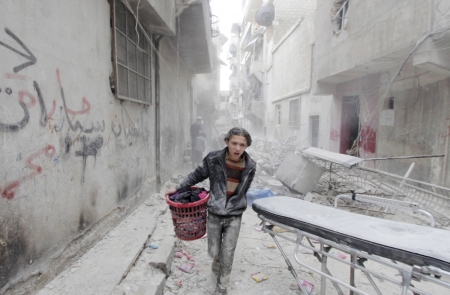Holocaust Museum Pulls Study Accused of Justifying Obama's Inaction in Syria

The United States Holocaust Memorial Museum has removed a new study from its website after facing scrutiny for seemingly absolving the Obama administration for its inaction in Syria despite the Bashar al-Assad regime's reported war crimes and use of chemical weapons on civilians.
The American Jewish magazine Tablet reports that the study, which was set to be released on Sept. 11, has been put on hold after some of its claims on Syria were met with harsh criticism by Jewish leaders and accused of justifying "bystanderism."
According to Tablet, which obtained parts of the study, the published report claims there wasn't much the Obama administration could have done to prevent human rights atrocities, such as genocide and the use of chemical weapons, from happening in Syria. The report was overseen by former Obama administration intelligence and national security official Cameron Hudson, who now directs the museum's Simon-Skjodt Center for the Prevention of Genocide.
Along with Hudson, Obama's former deputy national security advisor, Ben Rhodes, "at least one of the architects of the Administration's policy in Syria" was appointed to the museum's Memorial Council before the end of Obama's term. Three other former NSC staff who worked under Obama are also now part of the museum's staff.
"Some Jewish communal leaders suggested ... that the museum's moral authority had been hijacked for a partisan re-writing of recent history, and alleged that the museum had absolved the Obama administration of any moral or political error in its response to mass atrocities in Syria," Tablet reports.
The museum explained in a statement on its website: "Last week the United States Holocaust Memorial Museum's Simon-Skjodt Center for the Prevention of Genocide released a research study that examined several decision points during the Syrian conflict. Since its release, a number of people with whom we have worked closely on Syria since the conflict's outbreak have expressed concerns with the study. The museum has decided to remove the study from its website as we evaluate this feedback."
The study reportedly asserted that "a variety of factors, which were more or less fixed, made it very difficult from the beginning for the U.S. government to take effective action to prevent atrocities in Syria, even compared with other challenging policy contexts."
Tablet also notes that the study uses computational modeling, game theory methods and interviews with experts and policymakers to argue that an increased U.S. support of anti-Assad rebels and an increase in military airstrikes on Assad forces after the August 2013 Ghouta chemical weapons attack wouldn't have reduced atrocities but could have added to them.
In 2012, Obama said that when it came to engaging the U.S military in Syria, "a red line for us is we start seeing a whole bunch of chemical weapons moving around or being utilized."
Obama has been criticized heavily by conservatives for not following through on the "red line" remark after the Assad regime's use of chemical weapons in Ghouta killed hundreds of people.
"If the reports are saying that nothing could have been done for Syria, this is something that every Syrian American I know considers grossly incorrect," Shlomo Bolts, a policy and advocacy officer with the Syrian American Council, told Tablet. "There was a lot that could have been done and that can still be done to stop the mass atrocities in Syria. There are still thousands of civilians in Syria who are being tortured in Assad's jails or fear imminent attacks by Assad forces and there is much that can be done to help them."
Rabbi Shmuly Yanklowitz, co-founder of Jews for Human Rights in Syria, argued that the report's conclusion on Syria diminishes the original intent behind the Holocaust Museum.
"When the presidential commission on the Holocaust decided the museum should also include a committee on conscience, the idea was that they should not merely preserve Holocaust memory but be a force to helping prevent future genocides and mass atrocities," Yanklowitz was quoted as saying. "To merely say no intervention could have made a difference strikes me as a strange conclusion if I understand it correctly. ... I don't think we have the right to choose inaction when we know the reality on the ground."
Brookings Institution fellow and literary critic Leon Wieseltier criticized the museum for "releasing an allegedly scientific study that justifies bystanderism."
"The first thing I have to say is: Shame on the Holocaust Museum," he told Tablet. "If I had the time, I would gin up a parody version of this that will give us the computational-modeling algorithmic counterfactual analysis of John J. McCloy's decision not to bomb the Auschwitz ovens in 1944."
Considering that the museum pulled the report, one Jewish leader believes that the museum's leadership now "understands that it made a misstep."
"I served three times on the Holocaust Commission. The institution is very dear to my heart. And I believe that it's appropriate — indeed, it's imperative — for the museum deal to with questions of genocide in contemporary current events. But in this case, several things are happening that are problematic," Abraham Foxman, the director of the Center of the Study of Anti-Semitism at the Museum of Jewish Heritage, told Tablet.
"First, the genocide isn't over. In the case of Rwanda and Bosnia, for example, the genocides were over and the museum was able to offer its assessment in hindsight. Two, more broadly I just don't think it's appropriate for the museum to issue this kind of judgement — that's beyond its mandate. This should be a place where one meets to discuss, to debate, to question, to challenge: Could more have been done? Where? How? Not to issue judgment, especially not in this politicized atmosphere."





















